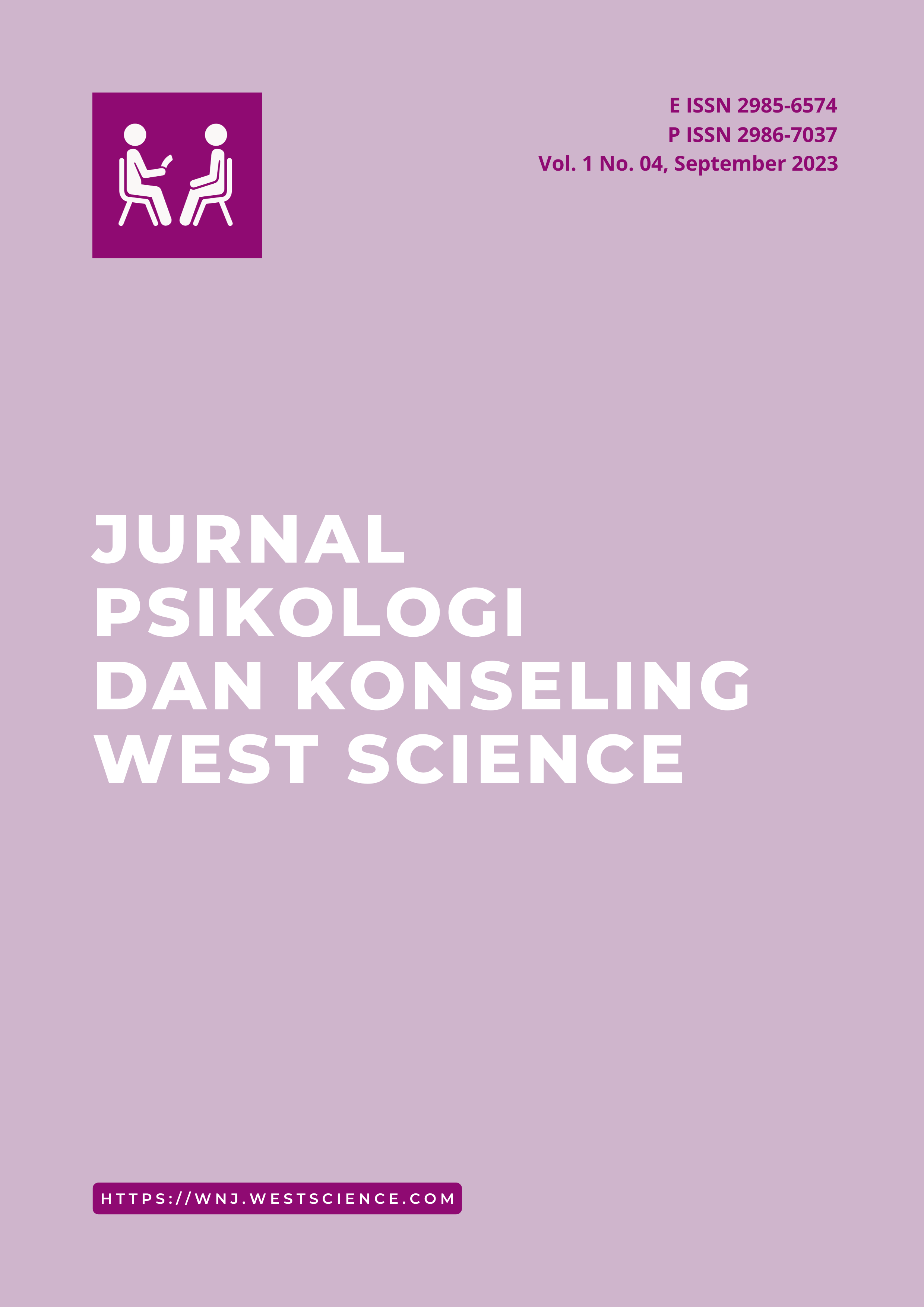Interaksi Psikologi Lingkungan dan Keberlanjutan di Jawa Barat: Memahami Peran Perilaku Manusia dalam Mendukung Lingkungan yang Berkelanjutan
DOI:
https://doi.org/10.58812/jpkws.v1i04.743Kata Kunci:
Psikologi, Lingkungan, Keberlanjutan, Jawa BaratAbstrak
Penelitian ini mengeksplorasi hubungan yang rumit antara psikologi lingkungan dan keberlanjutan dalam konteks Jawa Barat, Indonesia. Dengan menggunakan pendekatan metode campuran yang menggabungkan survei, wawancara, dan observasi, penelitian ini menyelidiki bagaimana sikap individu, faktor sosioekonomi, dan pengaruh budaya berdampak pada perilaku berkelanjutan. Hasil penelitian ini mengkonfirmasi peran penting psikologi lingkungan dalam mempromosikan keberlanjutan, mengungkapkan bahwa sikap positif dan keterikatan pada tempat merupakan prediktor kuat dari tindakan pro-lingkungan. Faktor sosial ekonomi dan budaya juga memainkan peran penting, dengan pendapatan, pendidikan, dan norma-norma budaya yang mempengaruhi praktik-praktik berkelanjutan. Wawancara dengan para pemangku kepentingan memberikan rekomendasi kebijakan yang berharga, yang menekankan pentingnya inisiatif pendidikan yang disesuaikan, proyek-proyek berbasis masyarakat, dan insentif ekonomi. Temuan-temuan ini memiliki implikasi yang lebih luas untuk pembangunan berkelanjutan di Jawa Barat, menyoroti perlunya strategi yang sesuai dengan konteks untuk mengatasi tantangan lingkungan. Dengan memahami interaksi antara perilaku manusia dan lingkungan, penelitian ini berkontribusi pada kemajuan praktik-praktik berkelanjutan di wilayah tersebut.
Referensi
Anggraeni, F. N., Burhanudin, M., & Aprillianno, Y. D. (2021). Improving Welfare in West Java through Environmental Sustainability Approach. The 1st International Conference on Regional Economic and Development.
Ardhiyansyah, A., Iskandar, Y., & Riniati, W. O. (2023). Perilaku Pro-Lingkungan dan Motivasi Sosial dalam Mengurangi Penggunaan Plastik Sekali Pakai. Jurnal Multidisiplin West Science, 2(07), 580–586.
Ben-Eli, M. U. (2018). Sustainability: definition and five core principles, a systems perspective. Sustainability Science, 13(5), 1337–1343.
DI GIUDA, G., Simone, P., & Marco, S. (2021). USE OF ENVIRONMENTAL PSYCHOLOGY AND VIRTUAL REALITY FOR A USER-CENTERED DESIGN APPROACH. Proceedings of the Eleventh International Structural Engineering and Construction Conference, 1–6.
Ernst, A., & Wenzel, U. (2014). Bringing environmental psychology into action. European Psychologist.
Grzelak, A., Borychowski, M., & Staniszewski, J. (2022). Economic, environmental, and social dimensions of farming sustainability–trade-off or synergy? Technological and Economic Development of Economy, 28(3), 655–675.
Hao, Y. (2023). Heading towards sustainable environment: does renewable and non-renewable energy generation matter for the effect of industrialization and urbanization on ecological footprint? Evidence from China. Environmental Science and Pollution Research, 30(12), 34282–34295.
Iskandar, Y., & Kaltum, U. (2021). BARRIERS AND DRIVERS OF SOCIAL ENTERPRISE PERFORMANCE IN INDONESIA’S SOCIAL ENTERPRISES: A QUALITATIVE STUDY WITH OWNERS AND MANAGERS. Jurnal Bisnisman: Riset Bisnis Dan Manajemen, 3(1), 54–67.
Iskandar, Y., & Kaltum, U. (2022). Exploring Human Resource and Organizational Factors That Influence the Performance of a Social Enterprise. Organizational Cultures: An International Journal, 22(2).
Iskandar, Y., & Sarastika, T. (2023). Study of Socio-Economic Aspect and Community Perception on The Development of The Agricultural Area Shrimp Ponds in Pasir mendit and Pasir Kadilangu. West Science Journal Economic and Entrepreneurship, 1(01), 28–36.
Jaman, U. B., Nuraeni, A. H., Pitaloka, B. P., & Gadri, K. Z. (2022). Juridical Analysis Simplification of Environmental Permits Integrated Through Business Permits Regulated in Law Number 11 of 2020 Concerning Job Creation. Libertas Law Journal, 1(1), 10–22.
Jaman, U. B., & Pertiwi, E. (2023). Kedaulatan Pajak Negara Indonesia Terhadap Perusahaan Multinasional Digital. Jurnal Aktiva: Riset Akuntansi Dan Keuangan, 5(1), 32–42.
Krisna, P. A. N., Supriatna, J., Suparmoko, M., & Garsetiasih, R. (2020). Sustainability of timor deer in captivity: Captive breeding systems in West Java, Indonesia. Tropical Conservation Science, 13, 1940082920915651.
Lakshmi, V., & Corbett, J. (2020). How artificial intelligence improves agricultural productivity and sustainability: A global thematic analysis.
Le, M. H., & Nguyen, P. M. (2022). Integrating the theory of planned behavior and the norm activation model to investigate organic food purchase intention: evidence from Vietnam. Sustainability, 14(2), 816.
Li, M., Li, L., & Strielkowski, W. (2019). The impact of urbanization and industrialization on energy security: A case study of China. Energies, 12(11), 2194.
Mota Jr, A., Guedes, A. P. P., dos Santos, A. M., Valois, R., Bispo, E., Almeida, B., & Armstrong, A. (2022). Climate Change and Sustainable Practices: Telehealth as a Tool for Sharing Indigenous Practices. International Journal of Advanced Engineering Research and Science, 9(11).
Nugraha, L. M., Winarno, B., Fahmi, S., & Lestari, S. (2022). Opportunities and challenges of urban green open space for climate change mitigation and adaptation in Bogor, West Java. IOP Conference Series: Earth and Environmental Science, 1109(1), 12013.
Purwanda, E., & Achmad, W. (2022). Environmental Concerns in the Framework of General Sustainable Development and Tourism Sustainability. Journal of Environmental Management & Tourism, 13(7), 1911–1917.
Rastegari Kopaei, H., Nooripoor, M., Karami, A., Petrescu-Mag, R. M., & Petrescu, D. C. (2021). Drivers of residents’ home composting intention: Integrating the theory of planned behavior, the norm activation model, and the moderating role of composting knowledge. Sustainability, 13(12), 6826.
Seonwoo, Y.-Y., & Jeong, Y.-D. (2021). Exploring factors that influence taekwondo student athletes’ intentions to pursue careers contributing to the sustainability of the Korean Taekwondo Industry using the theory of planned behavior. Sustainability, 13(17), 9893.
Tommasetti, A., Singer, P., Troisi, O., & Maione, G. (2018). Extended theory of planned behavior (ETPB): Investigating customers’ perception of restaurants’ sustainability by testing a structural equation model. Sustainability, 10(7), 2580.
Wijerathna-Yapa, A., & Pathirana, R. (2022). Sustainable Agro-Food Systems for Addressing Climate Change and Food Security. Agriculture, 12(10), 1554.
Wong, J.-Y., Hsiung, M.-L., Lee, S.-J., & ChouHuang, C.-Y. (2021). The relationship between endurance involvement and travel behavior in camping and the moderating effect of place attachment. Sustainability, 13(9), 5016.
Zhou, J., Yhee, Y., Kim, E., Kim, J.-Y., & Koo, C. (2021). Sustainable tourism cities: Linking idol attachment to sense of place. Sustainability, 13(5), 2763.
Unduhan
Diterbitkan
Cara Mengutip
Terbitan
Bagian
Lisensi
Hak Cipta (c) 2023 Loso Judijanto

Artikel ini berlisensiCreative Commons Attribution-ShareAlike 4.0 International License.



















 Instagram
Instagram 